牛津译林版(2019)选择性必修第四册Unit 2 Understanding each other Section B Grammar and usage学案(含答案)
文档属性
| 名称 | 牛津译林版(2019)选择性必修第四册Unit 2 Understanding each other Section B Grammar and usage学案(含答案) | 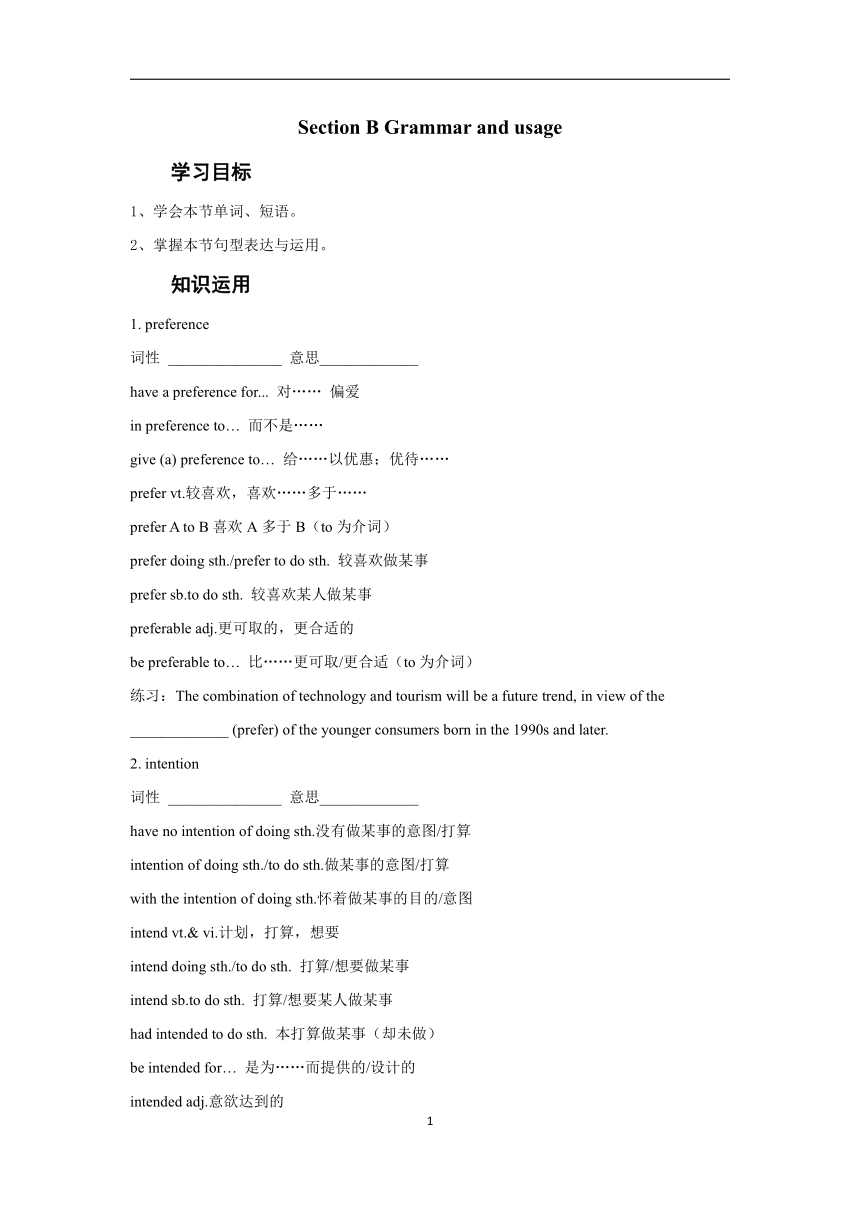 | |
| 格式 | docx | ||
| 文件大小 | 36.0KB | ||
| 资源类型 | 教案 | ||
| 版本资源 | 牛津译林版(2019) | ||
| 科目 | 英语 | ||
| 更新时间 | 2022-10-10 17:28:11 | ||
图片预览

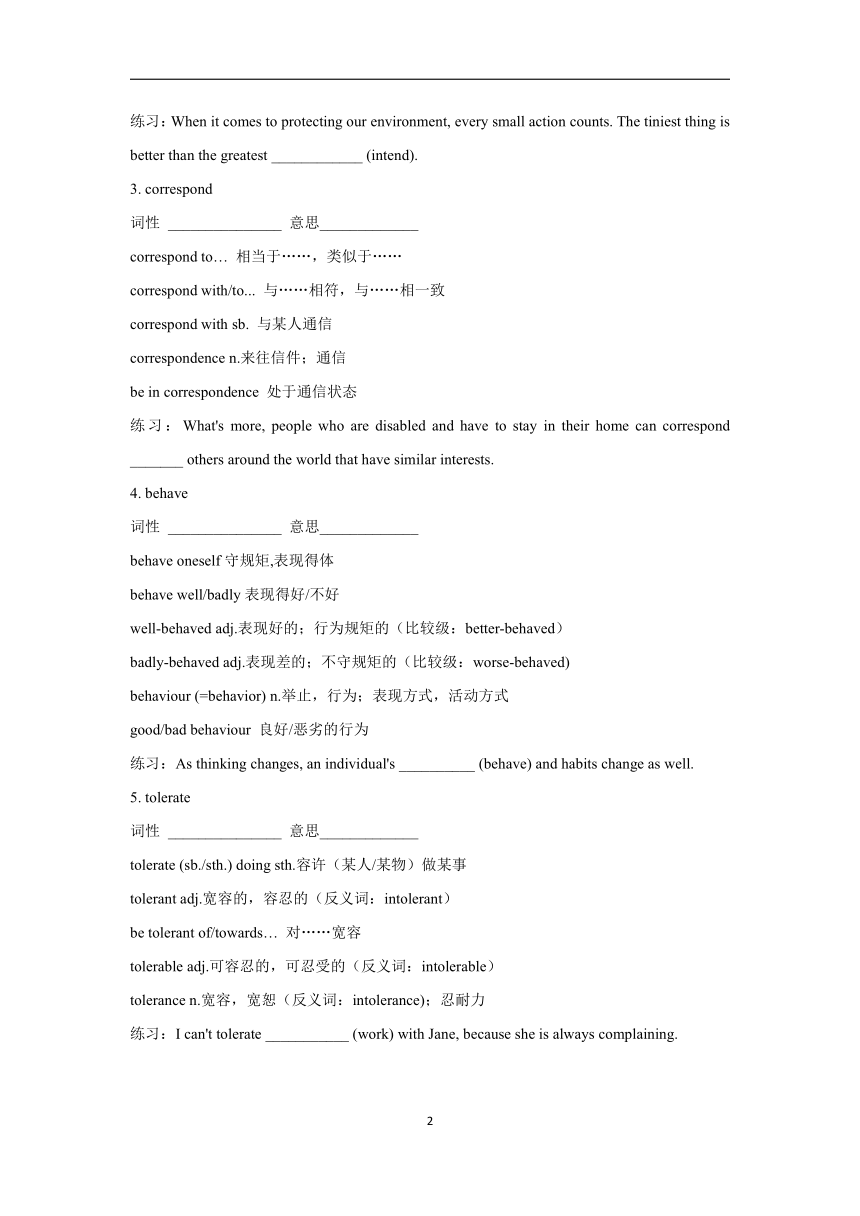
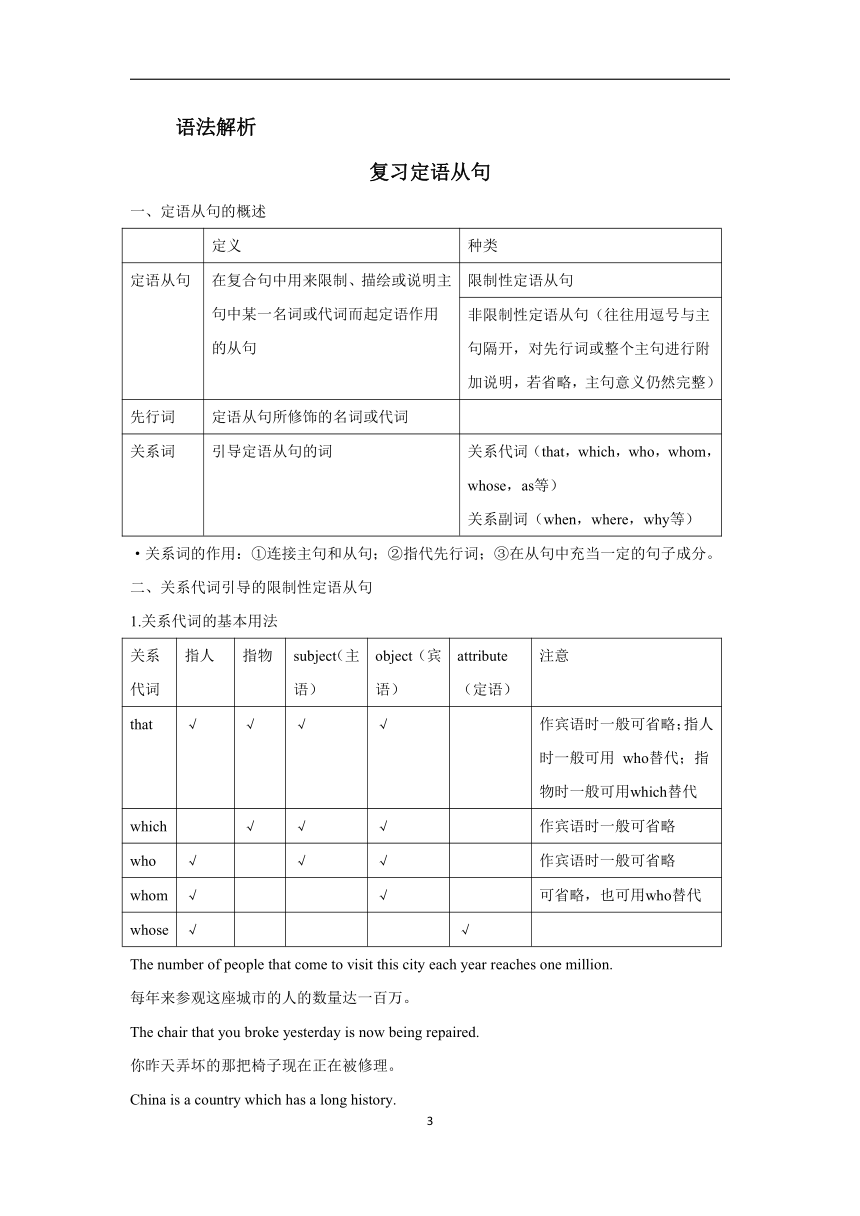
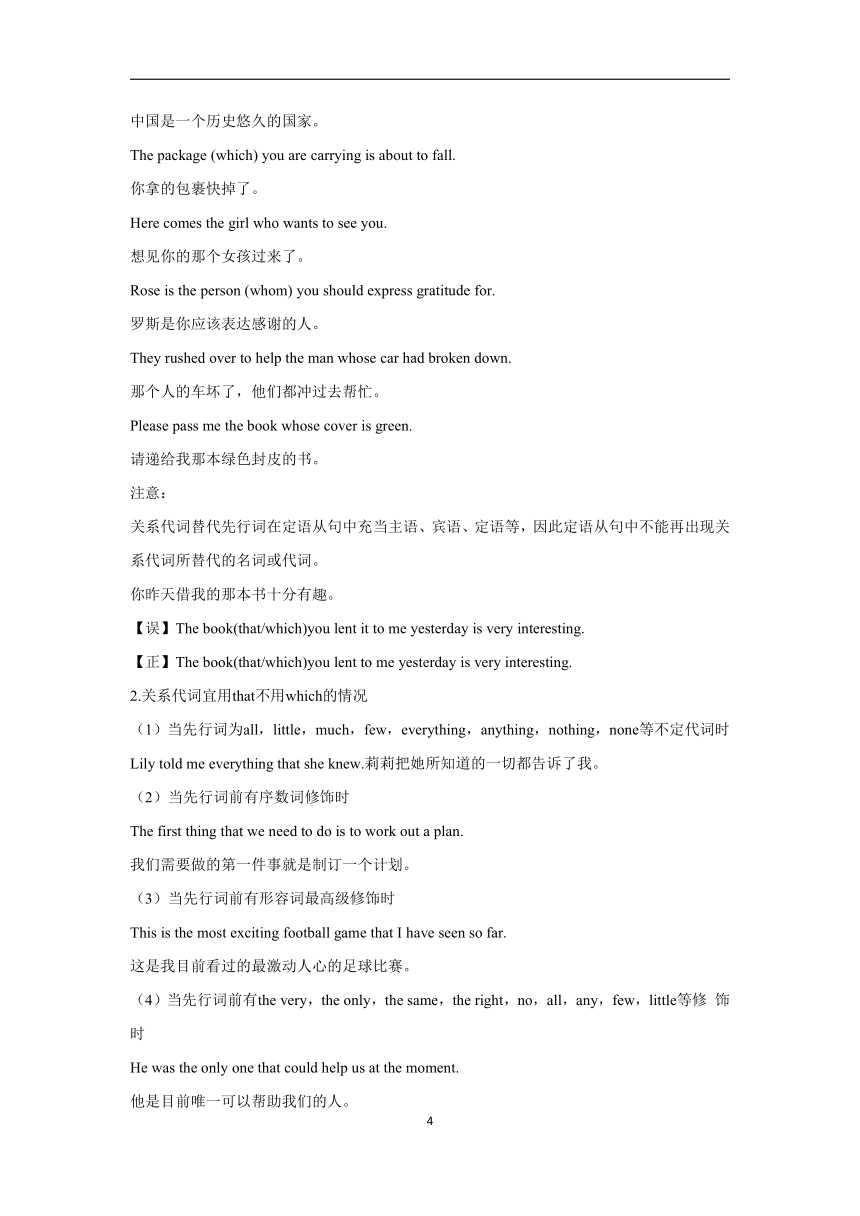
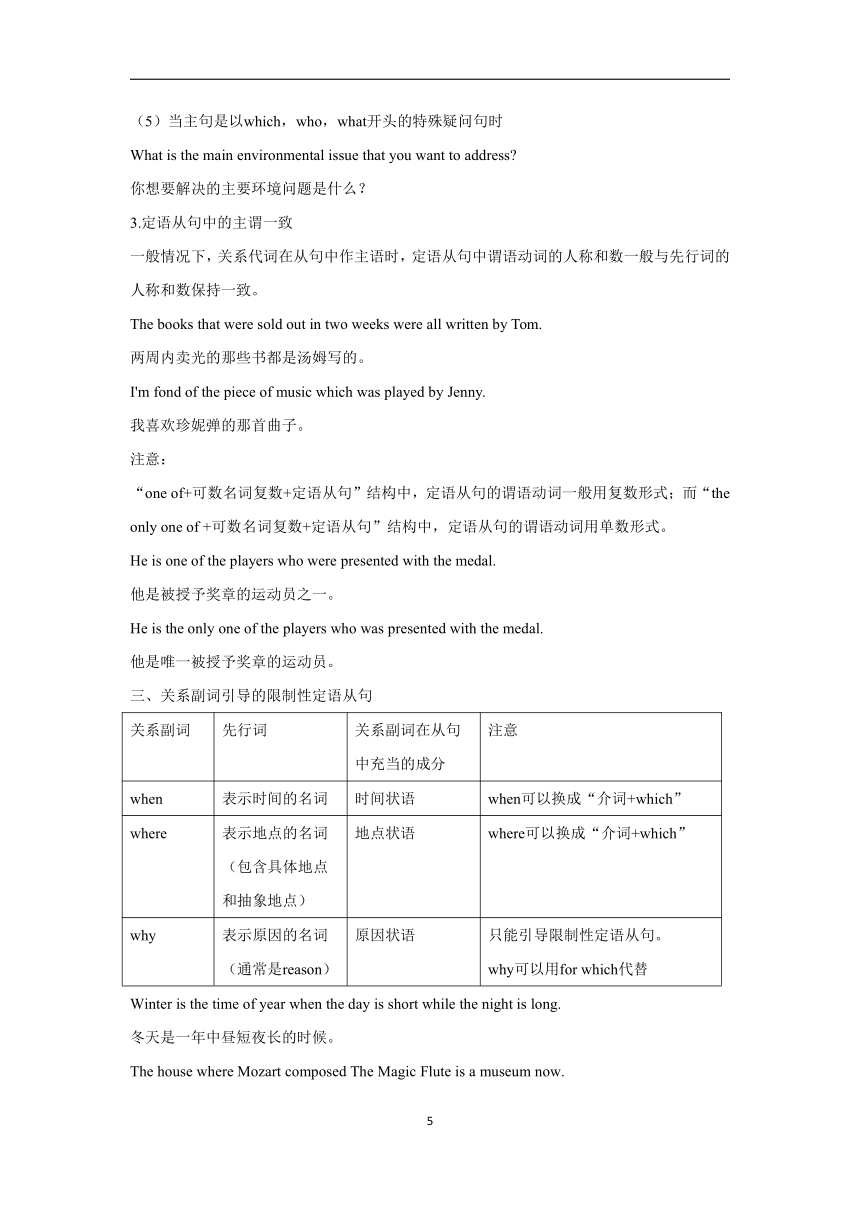
文档简介
Section B Grammar and usage
学习目标
1、学会本节单词、短语。
2、掌握本节句型表达与运用。
知识运用
1. preference
词性 _______________ 意思_____________
have a preference for... 对…… 偏爱
in preference to… 而不是……
give (a) preference to… 给……以优惠;优待……
prefer vt.较喜欢,喜欢……多于……
prefer A to B喜欢A多于B(to为介词)
prefer doing sth./prefer to do sth. 较喜欢做某事
prefer sb.to do sth. 较喜欢某人做某事
preferable adj.更可取的,更合适的
be preferable to… 比……更可取/更合适(to为介词)
练习:The combination of technology and tourism will be a future trend, in view of the _____________ (prefer) of the younger consumers born in the 1990s and later.
2. intention
词性 _______________ 意思_____________
have no intention of doing sth.没有做某事的意图/打算
intention of doing sth./to do sth.做某事的意图/打算
with the intention of doing sth.怀着做某事的目的/意图
intend vt.& vi.计划,打算,想要
intend doing sth./to do sth. 打算/想要做某事
intend sb.to do sth. 打算/想要某人做某事
had intended to do sth. 本打算做某事(却未做)
be intended for… 是为……而提供的/设计的
intended adj.意欲达到的
练习:When it comes to protecting our environment, every small action counts. The tiniest thing is better than the greatest ____________ (intend).
3. correspond
词性 _______________ 意思_____________
correspond to… 相当于……,类似于……
correspond with/to... 与……相符,与……相一致
correspond with sb. 与某人通信
correspondence n.来往信件;通信
be in correspondence 处于通信状态
练习:What's more, people who are disabled and have to stay in their home can correspond _______ others around the world that have similar interests.
4. behave
词性 _______________ 意思_____________
behave oneself守规矩,表现得体
behave well/badly表现得好/不好
well-behaved adj.表现好的;行为规矩的(比较级:better-behaved)
badly-behaved adj.表现差的;不守规矩的(比较级:worse-behaved)
behaviour (=behavior) n.举止,行为;表现方式,活动方式
good/bad behaviour 良好/恶劣的行为
练习:As thinking changes, an individual's __________ (behave) and habits change as well.
5. tolerate
词性 _______________ 意思_____________
tolerate (sb./sth.) doing sth.容许(某人/某物)做某事
tolerant adj.宽容的,容忍的(反义词:intolerant)
be tolerant of/towards… 对……宽容
tolerable adj.可容忍的,可忍受的(反义词:intolerable)
tolerance n.宽容,宽恕(反义词:intolerance);忍耐力
练习:I can't tolerate ___________ (work) with Jane, because she is always complaining.
语法解析
复习定语从句
一、定语从句的概述
定义 种类
定语从句 在复合句中用来限制、描绘或说明主句中某一名词或代词而起定语作用的从句 限制性定语从句
非限制性定语从句(往往用逗号与主句隔开,对先行词或整个主句进行附加说明,若省略,主句意义仍然完整)
先行词 定语从句所修饰的名词或代词
关系词 引导定语从句的词 关系代词(that,which,who,whom,whose,as等) 关系副词(when,where,why等)
·关系词的作用:①连接主句和从句;②指代先行词;③在从句中充当一定的句子成分。
二、关系代词引导的限制性定语从句
1.关系代词的基本用法
关系代词 指人 指物 subject(主语) object(宾语) attribute(定语) 注意
that √ √ √ √ 作宾语时一般可省略;指人时一般可用 who替代;指物时一般可用which替代
which √ √ √ 作宾语时一般可省略
who √ √ √ 作宾语时一般可省略
whom √ √ 可省略,也可用who替代
whose √ √
The number of people that come to visit this city each year reaches one million.
每年来参观这座城市的人的数量达一百万。
The chair that you broke yesterday is now being repaired.
你昨天弄坏的那把椅子现在正在被修理。
China is a country which has a long history.
中国是一个历史悠久的国家。
The package (which) you are carrying is about to fall.
你拿的包裹快掉了。
Here comes the girl who wants to see you.
想见你的那个女孩过来了。
Rose is the person (whom) you should express gratitude for.
罗斯是你应该表达感谢的人。
They rushed over to help the man whose car had broken down.
那个人的车坏了,他们都冲过去帮忙。
Please pass me the book whose cover is green.
请递给我那本绿色封皮的书。
注意:
关系代词替代先行词在定语从句中充当主语、宾语、定语等,因此定语从句中不能再出现关系代词所替代的名词或代词。
你昨天借我的那本书十分有趣。
【误】The book(that/which)you lent it to me yesterday is very interesting.
【正】The book(that/which)you lent to me yesterday is very interesting.
2.关系代词宜用that不用which的情况
(1)当先行词为all,little,much,few,everything,anything,nothing,none等不定代词时
Lily told me everything that she knew.莉莉把她所知道的一切都告诉了我。
(2)当先行词前有序数词修饰时
The first thing that we need to do is to work out a plan.
我们需要做的第一件事就是制订一个计划。
(3)当先行词前有形容词最高级修饰时
This is the most exciting football game that I have seen so far.
这是我目前看过的最激动人心的足球比赛。
(4)当先行词前有the very,the only,the same,the right,no,all,any,few,little等修 饰时
He was the only one that could help us at the moment.
他是目前唯一可以帮助我们的人。
(5)当主句是以which,who,what开头的特殊疑问句时
What is the main environmental issue that you want to address
你想要解决的主要环境问题是什么?
3.定语从句中的主谓一致
一般情况下,关系代词在从句中作主语时,定语从句中谓语动词的人称和数一般与先行词的人称和数保持一致。
The books that were sold out in two weeks were all written by Tom.
两周内卖光的那些书都是汤姆写的。
I'm fond of the piece of music which was played by Jenny.
我喜欢珍妮弹的那首曲子。
注意:
“one of+可数名词复数+定语从句”结构中,定语从句的谓语动词一般用复数形式;而“the only one of +可数名词复数+定语从句”结构中,定语从句的谓语动词用单数形式。
He is one of the players who were presented with the medal.
他是被授予奖章的运动员之一。
He is the only one of the players who was presented with the medal.
他是唯一被授予奖章的运动员。
三、关系副词引导的限制性定语从句
关系副词 先行词 关系副词在从句中充当的成分 注意
when 表示时间的名词 时间状语 when可以换成“介词+which”
where 表示地点的名词(包含具体地点和抽象地点) 地点状语 where可以换成“介词+which”
why 表示原因的名词(通常是reason) 原因状语 只能引导限制性定语从句。 why可以用for which代替
Winter is the time of year when the day is short while the night is long.
冬天是一年中昼短夜长的时候。
The house where Mozart composed The Magic Flute is a museum now.
莫扎特在里面创作出《魔笛》的那所房子现在是一座博物馆。
This is the reason why Bob left in a hurry.
这就是鲍勃匆匆离去的原因。
注意:
当先行词是表示时间、地点的名词或reason时,既可以用关系副词引导定语从句,也可以用that或which引导定语从句,关键要看关系词在定语从句中作何种成分。若关系词在定语从句中充当状语,则用相应的关系副词引导;若关系词在定语从句中充当主语或宾语,则用that或which引导。
Do you still remember the days (that/which) we spent together on the farm
你还记得我们一起在农场度过的那些日子吗?
Do you still remember the days when we chatted with each other all night
你还记得我们整夜聊天的那些日子吗?
His father works in a factory which/that makes radio parts.
他的父亲在一家制造收音机零件的工厂里工作。
The reason that he told me yesterday is a lie.
昨天他告诉我的理由是个谎言。
辨析:
where引导的从句类型 性质 功能 是否可与“介词+ which”互换 位置
定语从句 关系副词 在定语从句中作地点状语,其前有一个表示地点的先行词 可以 只能位于主句之后或句中,不能位于句首
状语从句 从属连词 引导地点状语从句,修饰主句中的谓语动词,前面没有表示 地点的名词 不能 可位于主句之前,也可位于主句之后
Is there a shop around where we can buy some fruit
附近有没有一家商店可以让我们买些水果?
We should go where we are needed.
我们应该到需要我们的地方去。
四、非限制性定语从句
关系代词 先行词 关系词在句中充当的成分 注意
who 指人 主语
whom 指人 宾语 不能省略,也不能用who替代
whose 指人/物 定语
which 指物 主语或宾语 作宾语时不能省略
as 指代整个主句或主句的一部分 主语或宾语 意为“正如”,从句的位置比较灵活,一般用逗号与主句隔开
注意:
1.which引导非限制性定语从句时,可以指代整个主句的内容。
Tom studies hard and likes to help others, which is what his parents expect.
汤姆学习努力且乐于助人,这正是他父母所期待的。
2.as引导非限制性定语从句时常用于以下搭配:
as is known to all(=as we all know)众所周知
as you can see 正如你所看见的
as mentioned above 如上所述
as has been said before 如前所述
as is hoped 正如所希望的
as is often the case 通常如此
As you can see, the children are really encouraged, and they are also enthusiastic about reading all of these books.
正如你所看到的,孩子们真的受到了激励,他们也满怀热情地去阅读所有这些书。
As is often the case, a small child will feel unhappy and can't stop crying the first time he or she goes to kindergarten.
通常情况下,小孩第一次上幼儿园时总会不高兴并会大哭不止。
辨析:
as和which引导非限制性定语从句的区别
关系代词 意义 从句位置
as 正如,像 可位于句首、句中或句末
which 这一点,这/那 一般位于主句之后
众所周知,上海是座大城市。
As is known to all, Shanghai is a big city.
Shanghai is a big city, as is known to all.
Shanghai, as is known to all, is a big city.
He made a long boring speech, which made us feel sleepy.
他的发言冗长且乏味,这让我们昏昏欲睡。
2.关系副词的选择
在非限制性定语从句中,关系副词(when,where)的选择方法和在限制性定语从句中的一样,即关系副词在从句中作时间状语时用when,作地点状语时用where。但why只用于引导限制性定语从句。
Our graduation will be held in July, when we'll say goodbye to our teachers.
我们的毕业典礼将于7月份举行,那时我们就要跟老师道别了。
Toby was abandoned on an island, where he stayed for as long as three months.
托比被抛弃在一个岛上,他在那里待了三个月之久。
3.非限制性定语从句需要注意的问题
(1)非限制性定语从句常常位于句末,但也可位于句中,这时前后都需要用逗号隔开。
The children, who all wanted to play football, were disappointed when it rained.
那些孩子都想踢足球,(当天)下雨时他们都感到失望。
(2)“介词+关系代词”也可以引导非限制性定语从句。先行词指人时关系代词用whom,不可用who或that;先行词指物时关系代词用which,不能用that。
Juliet appeared above at a window, through which her exceeding beauty seemed to break like the light of the sun in the east.
朱丽叶在上面一扇窗口露面了,她那绝色美貌宛如东方的太阳光芒初放。
A friend is someone who brings your best qualities out, with whom you sparkle and become more knowledgeable.
朋友就是能使你表现出你的最佳品质的人,与他在一起你就会生气勃勃,更有见识。
(3)“名词/代词/数词+介词of+关系代词”引导的定语从句通常是非限制性定语从句。
He has written a science fiction, the name of which I have completely forgotten.
他写了一部科幻小说,小说的名字我完全忘记了。
It is a family of 8 children, all of whom have got PhD in chemistry.
这是一个有8个孩子的家庭,他们都获得了化学博士学位。
注意:
“名词+介词of+关系代词”有时可以用“whose+名词”或“of+关系代词+名词”替换。
那幢楼房曾经被整修过,但在一场大火中,楼顶又被烧毁了。
The building had been repaired, the roof of which was destroyed again in a big fire.
The building had been repaired, whose roof was destroyed again in a big fire.
The building had been repaired, of which the roof was destroyed again in a big fire.
练习:
1. I have seen most of the greatest buildings in the world __________ are famous on the Internet.
2. This novel is popular with those ____________ were born in the 1980s.
3. As the youngest child of his family, Alex is always longing for the time ________ he should be able to be independent.
4. The thought of going back home was all __________ kept him happy while he was working abroad.
5. Although modern technology could help produce more crops, these terraces( 梯田)still mean a lot to the local people ___________ whom traditions are of great value.
6. The professor always spends the whole day in the bookshop ________ which he found a new dictionary yesterday.
7. In the morning, two artists, __________ painting skills are wonderful, came to our school as planned.
8. When you start your journey of positive thinking, you shall meet wonderful people, with ___________ you can share positive attitudes.
9. In China, a teahouse is a place __________ people gather to enjoy tea, chat and socialize.
10. The reason __________ someone is triggered by something and others are not is often due to one's personal history and psychological traits.
11. A key finding is that over time, children raised by an authoritative father were significantly more likely to develop persistence, __________ leads to better outcomes in school.
12. Zhang Guimei, ___________ is a female high school headmaster, devotes herself to the education of the girls.
13. ___________ we all know, motivation is an important factor affecting the learning effect.
答案
知识运用
1. preference(s) 2. intention 3. with 4. behaviour/ behavior 5. working
语法解析
1. that 2. who 3. when 4. that 5. to 6.in 7.whose 8.whom 9. where 10. why 11. which 12. who 13. As
2
学习目标
1、学会本节单词、短语。
2、掌握本节句型表达与运用。
知识运用
1. preference
词性 _______________ 意思_____________
have a preference for... 对…… 偏爱
in preference to… 而不是……
give (a) preference to… 给……以优惠;优待……
prefer vt.较喜欢,喜欢……多于……
prefer A to B喜欢A多于B(to为介词)
prefer doing sth./prefer to do sth. 较喜欢做某事
prefer sb.to do sth. 较喜欢某人做某事
preferable adj.更可取的,更合适的
be preferable to… 比……更可取/更合适(to为介词)
练习:The combination of technology and tourism will be a future trend, in view of the _____________ (prefer) of the younger consumers born in the 1990s and later.
2. intention
词性 _______________ 意思_____________
have no intention of doing sth.没有做某事的意图/打算
intention of doing sth./to do sth.做某事的意图/打算
with the intention of doing sth.怀着做某事的目的/意图
intend vt.& vi.计划,打算,想要
intend doing sth./to do sth. 打算/想要做某事
intend sb.to do sth. 打算/想要某人做某事
had intended to do sth. 本打算做某事(却未做)
be intended for… 是为……而提供的/设计的
intended adj.意欲达到的
练习:When it comes to protecting our environment, every small action counts. The tiniest thing is better than the greatest ____________ (intend).
3. correspond
词性 _______________ 意思_____________
correspond to… 相当于……,类似于……
correspond with/to... 与……相符,与……相一致
correspond with sb. 与某人通信
correspondence n.来往信件;通信
be in correspondence 处于通信状态
练习:What's more, people who are disabled and have to stay in their home can correspond _______ others around the world that have similar interests.
4. behave
词性 _______________ 意思_____________
behave oneself守规矩,表现得体
behave well/badly表现得好/不好
well-behaved adj.表现好的;行为规矩的(比较级:better-behaved)
badly-behaved adj.表现差的;不守规矩的(比较级:worse-behaved)
behaviour (=behavior) n.举止,行为;表现方式,活动方式
good/bad behaviour 良好/恶劣的行为
练习:As thinking changes, an individual's __________ (behave) and habits change as well.
5. tolerate
词性 _______________ 意思_____________
tolerate (sb./sth.) doing sth.容许(某人/某物)做某事
tolerant adj.宽容的,容忍的(反义词:intolerant)
be tolerant of/towards… 对……宽容
tolerable adj.可容忍的,可忍受的(反义词:intolerable)
tolerance n.宽容,宽恕(反义词:intolerance);忍耐力
练习:I can't tolerate ___________ (work) with Jane, because she is always complaining.
语法解析
复习定语从句
一、定语从句的概述
定义 种类
定语从句 在复合句中用来限制、描绘或说明主句中某一名词或代词而起定语作用的从句 限制性定语从句
非限制性定语从句(往往用逗号与主句隔开,对先行词或整个主句进行附加说明,若省略,主句意义仍然完整)
先行词 定语从句所修饰的名词或代词
关系词 引导定语从句的词 关系代词(that,which,who,whom,whose,as等) 关系副词(when,where,why等)
·关系词的作用:①连接主句和从句;②指代先行词;③在从句中充当一定的句子成分。
二、关系代词引导的限制性定语从句
1.关系代词的基本用法
关系代词 指人 指物 subject(主语) object(宾语) attribute(定语) 注意
that √ √ √ √ 作宾语时一般可省略;指人时一般可用 who替代;指物时一般可用which替代
which √ √ √ 作宾语时一般可省略
who √ √ √ 作宾语时一般可省略
whom √ √ 可省略,也可用who替代
whose √ √
The number of people that come to visit this city each year reaches one million.
每年来参观这座城市的人的数量达一百万。
The chair that you broke yesterday is now being repaired.
你昨天弄坏的那把椅子现在正在被修理。
China is a country which has a long history.
中国是一个历史悠久的国家。
The package (which) you are carrying is about to fall.
你拿的包裹快掉了。
Here comes the girl who wants to see you.
想见你的那个女孩过来了。
Rose is the person (whom) you should express gratitude for.
罗斯是你应该表达感谢的人。
They rushed over to help the man whose car had broken down.
那个人的车坏了,他们都冲过去帮忙。
Please pass me the book whose cover is green.
请递给我那本绿色封皮的书。
注意:
关系代词替代先行词在定语从句中充当主语、宾语、定语等,因此定语从句中不能再出现关系代词所替代的名词或代词。
你昨天借我的那本书十分有趣。
【误】The book(that/which)you lent it to me yesterday is very interesting.
【正】The book(that/which)you lent to me yesterday is very interesting.
2.关系代词宜用that不用which的情况
(1)当先行词为all,little,much,few,everything,anything,nothing,none等不定代词时
Lily told me everything that she knew.莉莉把她所知道的一切都告诉了我。
(2)当先行词前有序数词修饰时
The first thing that we need to do is to work out a plan.
我们需要做的第一件事就是制订一个计划。
(3)当先行词前有形容词最高级修饰时
This is the most exciting football game that I have seen so far.
这是我目前看过的最激动人心的足球比赛。
(4)当先行词前有the very,the only,the same,the right,no,all,any,few,little等修 饰时
He was the only one that could help us at the moment.
他是目前唯一可以帮助我们的人。
(5)当主句是以which,who,what开头的特殊疑问句时
What is the main environmental issue that you want to address
你想要解决的主要环境问题是什么?
3.定语从句中的主谓一致
一般情况下,关系代词在从句中作主语时,定语从句中谓语动词的人称和数一般与先行词的人称和数保持一致。
The books that were sold out in two weeks were all written by Tom.
两周内卖光的那些书都是汤姆写的。
I'm fond of the piece of music which was played by Jenny.
我喜欢珍妮弹的那首曲子。
注意:
“one of+可数名词复数+定语从句”结构中,定语从句的谓语动词一般用复数形式;而“the only one of +可数名词复数+定语从句”结构中,定语从句的谓语动词用单数形式。
He is one of the players who were presented with the medal.
他是被授予奖章的运动员之一。
He is the only one of the players who was presented with the medal.
他是唯一被授予奖章的运动员。
三、关系副词引导的限制性定语从句
关系副词 先行词 关系副词在从句中充当的成分 注意
when 表示时间的名词 时间状语 when可以换成“介词+which”
where 表示地点的名词(包含具体地点和抽象地点) 地点状语 where可以换成“介词+which”
why 表示原因的名词(通常是reason) 原因状语 只能引导限制性定语从句。 why可以用for which代替
Winter is the time of year when the day is short while the night is long.
冬天是一年中昼短夜长的时候。
The house where Mozart composed The Magic Flute is a museum now.
莫扎特在里面创作出《魔笛》的那所房子现在是一座博物馆。
This is the reason why Bob left in a hurry.
这就是鲍勃匆匆离去的原因。
注意:
当先行词是表示时间、地点的名词或reason时,既可以用关系副词引导定语从句,也可以用that或which引导定语从句,关键要看关系词在定语从句中作何种成分。若关系词在定语从句中充当状语,则用相应的关系副词引导;若关系词在定语从句中充当主语或宾语,则用that或which引导。
Do you still remember the days (that/which) we spent together on the farm
你还记得我们一起在农场度过的那些日子吗?
Do you still remember the days when we chatted with each other all night
你还记得我们整夜聊天的那些日子吗?
His father works in a factory which/that makes radio parts.
他的父亲在一家制造收音机零件的工厂里工作。
The reason that he told me yesterday is a lie.
昨天他告诉我的理由是个谎言。
辨析:
where引导的从句类型 性质 功能 是否可与“介词+ which”互换 位置
定语从句 关系副词 在定语从句中作地点状语,其前有一个表示地点的先行词 可以 只能位于主句之后或句中,不能位于句首
状语从句 从属连词 引导地点状语从句,修饰主句中的谓语动词,前面没有表示 地点的名词 不能 可位于主句之前,也可位于主句之后
Is there a shop around where we can buy some fruit
附近有没有一家商店可以让我们买些水果?
We should go where we are needed.
我们应该到需要我们的地方去。
四、非限制性定语从句
关系代词 先行词 关系词在句中充当的成分 注意
who 指人 主语
whom 指人 宾语 不能省略,也不能用who替代
whose 指人/物 定语
which 指物 主语或宾语 作宾语时不能省略
as 指代整个主句或主句的一部分 主语或宾语 意为“正如”,从句的位置比较灵活,一般用逗号与主句隔开
注意:
1.which引导非限制性定语从句时,可以指代整个主句的内容。
Tom studies hard and likes to help others, which is what his parents expect.
汤姆学习努力且乐于助人,这正是他父母所期待的。
2.as引导非限制性定语从句时常用于以下搭配:
as is known to all(=as we all know)众所周知
as you can see 正如你所看见的
as mentioned above 如上所述
as has been said before 如前所述
as is hoped 正如所希望的
as is often the case 通常如此
As you can see, the children are really encouraged, and they are also enthusiastic about reading all of these books.
正如你所看到的,孩子们真的受到了激励,他们也满怀热情地去阅读所有这些书。
As is often the case, a small child will feel unhappy and can't stop crying the first time he or she goes to kindergarten.
通常情况下,小孩第一次上幼儿园时总会不高兴并会大哭不止。
辨析:
as和which引导非限制性定语从句的区别
关系代词 意义 从句位置
as 正如,像 可位于句首、句中或句末
which 这一点,这/那 一般位于主句之后
众所周知,上海是座大城市。
As is known to all, Shanghai is a big city.
Shanghai is a big city, as is known to all.
Shanghai, as is known to all, is a big city.
He made a long boring speech, which made us feel sleepy.
他的发言冗长且乏味,这让我们昏昏欲睡。
2.关系副词的选择
在非限制性定语从句中,关系副词(when,where)的选择方法和在限制性定语从句中的一样,即关系副词在从句中作时间状语时用when,作地点状语时用where。但why只用于引导限制性定语从句。
Our graduation will be held in July, when we'll say goodbye to our teachers.
我们的毕业典礼将于7月份举行,那时我们就要跟老师道别了。
Toby was abandoned on an island, where he stayed for as long as three months.
托比被抛弃在一个岛上,他在那里待了三个月之久。
3.非限制性定语从句需要注意的问题
(1)非限制性定语从句常常位于句末,但也可位于句中,这时前后都需要用逗号隔开。
The children, who all wanted to play football, were disappointed when it rained.
那些孩子都想踢足球,(当天)下雨时他们都感到失望。
(2)“介词+关系代词”也可以引导非限制性定语从句。先行词指人时关系代词用whom,不可用who或that;先行词指物时关系代词用which,不能用that。
Juliet appeared above at a window, through which her exceeding beauty seemed to break like the light of the sun in the east.
朱丽叶在上面一扇窗口露面了,她那绝色美貌宛如东方的太阳光芒初放。
A friend is someone who brings your best qualities out, with whom you sparkle and become more knowledgeable.
朋友就是能使你表现出你的最佳品质的人,与他在一起你就会生气勃勃,更有见识。
(3)“名词/代词/数词+介词of+关系代词”引导的定语从句通常是非限制性定语从句。
He has written a science fiction, the name of which I have completely forgotten.
他写了一部科幻小说,小说的名字我完全忘记了。
It is a family of 8 children, all of whom have got PhD in chemistry.
这是一个有8个孩子的家庭,他们都获得了化学博士学位。
注意:
“名词+介词of+关系代词”有时可以用“whose+名词”或“of+关系代词+名词”替换。
那幢楼房曾经被整修过,但在一场大火中,楼顶又被烧毁了。
The building had been repaired, the roof of which was destroyed again in a big fire.
The building had been repaired, whose roof was destroyed again in a big fire.
The building had been repaired, of which the roof was destroyed again in a big fire.
练习:
1. I have seen most of the greatest buildings in the world __________ are famous on the Internet.
2. This novel is popular with those ____________ were born in the 1980s.
3. As the youngest child of his family, Alex is always longing for the time ________ he should be able to be independent.
4. The thought of going back home was all __________ kept him happy while he was working abroad.
5. Although modern technology could help produce more crops, these terraces( 梯田)still mean a lot to the local people ___________ whom traditions are of great value.
6. The professor always spends the whole day in the bookshop ________ which he found a new dictionary yesterday.
7. In the morning, two artists, __________ painting skills are wonderful, came to our school as planned.
8. When you start your journey of positive thinking, you shall meet wonderful people, with ___________ you can share positive attitudes.
9. In China, a teahouse is a place __________ people gather to enjoy tea, chat and socialize.
10. The reason __________ someone is triggered by something and others are not is often due to one's personal history and psychological traits.
11. A key finding is that over time, children raised by an authoritative father were significantly more likely to develop persistence, __________ leads to better outcomes in school.
12. Zhang Guimei, ___________ is a female high school headmaster, devotes herself to the education of the girls.
13. ___________ we all know, motivation is an important factor affecting the learning effect.
答案
知识运用
1. preference(s) 2. intention 3. with 4. behaviour/ behavior 5. working
语法解析
1. that 2. who 3. when 4. that 5. to 6.in 7.whose 8.whom 9. where 10. why 11. which 12. who 13. As
2
同课章节目录
